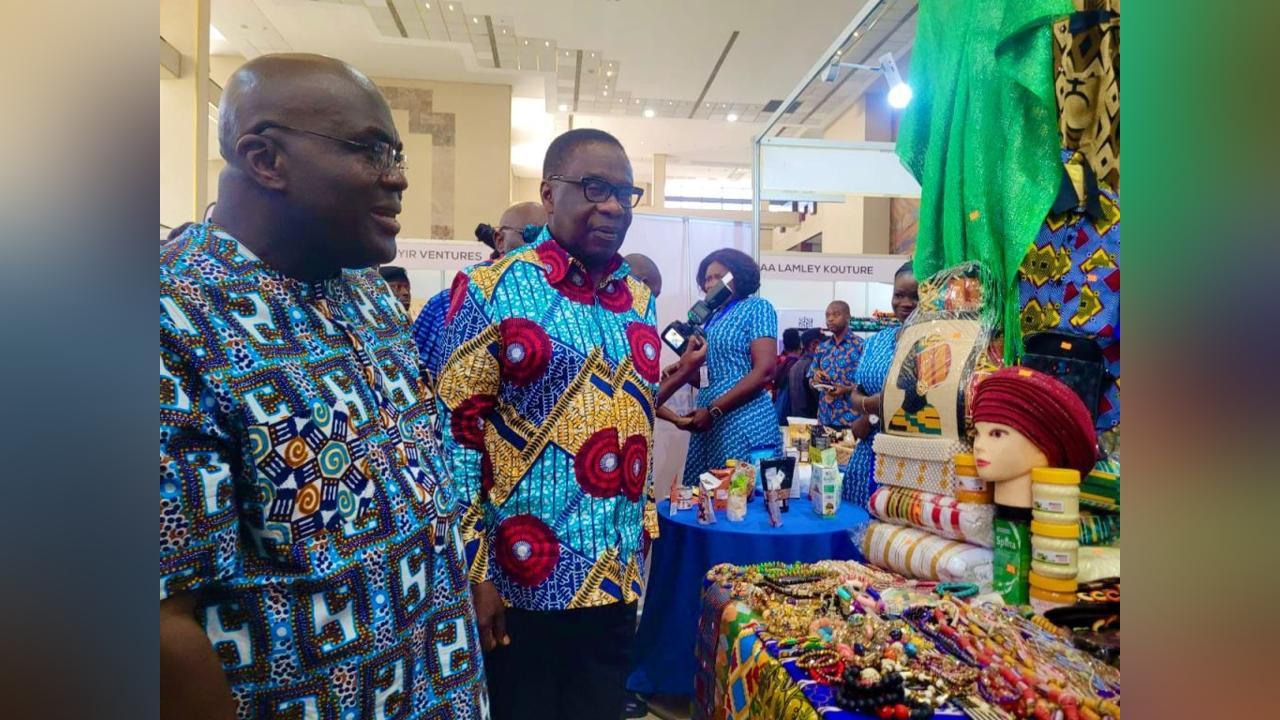Africa-Press – Ghana. Mr Sampson Ahi, Deputy Minister for Trade, Agribusiness and Industry, has hailed the Made-in-Ghana Bazaar as a bold driver of economic diplomacy and a strategic platform for strengthening exports.
He said the Government remained committed to transforming Ghana into a globally competitive and export-led economy.
Mr Ahi, in a speech at the opening of the 4th Made-in-Ghana Bazaar in Accra on Thursday, said the annual event had grown into more than a showcase of local products, becoming “a symbol of the innovation, resilience, and global aspiration of Ghanaian enterprise.”
The Made-in-Ghana Bazaar, initiated in 2018 as a flagship programme of the Ministry of Foreign Affairs, has been institutionalised as an annual event.
This year’s edition is being held on the theme: “Championing Economic Diplomacy: Connecting Producers, Markets, and Opportunities.”
The three-day event has convened Ghanaian producers, foreign diplomats, trade experts and business associations to showcase processed cocoa, shea butter, textiles, handicrafts, value-added minerals, and other locally manufactured products.
The Deputy Minister of Trade said, “This year’s theme reminds us that economic diplomacy is not just a slogan, but a dynamic process that integrates trade promotion, investment facilitation, and the advancement of our national economic interests on the global stage.”
He explained that for Ghana to unlock its full potential, economic diplomacy must be anchored in deliberate trade diplomacy, which secures new markets for producers, attracts investment, and builds partnerships that accelerate industrialisation.
Mr Ahi said, “The Made-in-Ghana Bazaar embodies this principle; It represents the convergence of trade diplomacy led by the Ministry of Foreign Affairs and trade policy driven by the Ministry of Trade, Agribusiness and Industry (MOTAI). This synergy is vital if we are to advance our export and industrial transformation agenda.”
The Deputy Minister announced that a comprehensive brochure was being developed as part of this year’s Bazaar, envisioned as a global directory of Made-in-Ghana products and export-related information to be distributed through Ghana’s Missions abroad.
“With proper collaboration, this directory will evolve into a strategic trade tool that supports our national export strategy, enhances business-to-business linkages, and strengthens Ghana’s global trade presence,” he said.
Mr Ahi praised the collaborative work of the Ghana Export Promotion Authority (GEPA), the Ghana Investment Promotion Centre (GIPC), and the Ghana Export-Import Bank (GEXIM), noting that their combined support in financing, market development, and investment facilitation was empowering local businesses to expand production and compete internationally.
“With the AfCFTA Secretariat headquartered in Accra, Ghana is uniquely positioned to align the Made-in-Ghana brand with continental opportunities and global value chains,” he said, and that “we must ensure that Made-in-Ghana is not just a national aspiration, but a global reality.”
The Chief of Staff, Mr Julius Debrah, urged Ghana’s envoys to become frontline ambassadors for Made-in-Ghana goods.
“The truth of the matter is that no country will do well if you don’t export much. If you become an import-dependent economy, naturally you are failing,” he said.
Mr Debrah said, “Even if it is only Ghanaian chocolate, let it be your mission that someone in your host country gets to know it, tastes it, and imports it. That alone will make you a very successful envoy of Ghana.”
Mr Debrah emphasised that Ghanaian products such as kente, stools, handicrafts, sandals and traditional clothing could achieve wider global appeal if backed by compelling narratives about their cultural symbolism.
He urged Ghanaians to rekindle national pride in using locally made goods, recalling an era when most items on the market were Ghanaian-made.
“This situation where almost everything we use is imported will not take us anywhere. If we do not do it for ourselves, nobody will do it for us,” he said, calling for deeper synergy between trade, agribusiness, industry and foreign affairs to build a resilient economy.
Foreign Minister, Mr Samuel Okudzeto Ablakwa, described the Bazaar as an institutionalised tool of economic diplomacy, enabling Ghanaian Missions to promote local goods and expand non-traditional exports.
He disclosed that his Ministry had made promotion of Made-in-Ghana goods part of the Key Performance Indicators (KPIs) for Heads of Mission. “Governments across the world are consciously promoting fairs, exhibitions, and missions to secure markets for their products. Ghana cannot be left behind,” he said.
Mr Ablakwa highlighted government’s flagship programmes such as the Rapid Industrialisation for Jobs Initiative, the Women in Trade, Agribusiness and Industry Programme, the Accelerated Export Development Programme, and the National Apprenticeship and Adwumawura initiatives, all aimed at creating jobs, empowering youth and women, and expanding exports.
He further revealed that 12 Ghana Missions abroad had already established Made-in-Ghana Corners in collaboration with GEXIM, with plans to extend the concept to all Missions. “These will eventually grow into permanent Made-in-Ghana shops worldwide,” he said.
According to him, targeted market intelligence had identified rising international demand for Ghanaian palm oil, cashew nuts, cocoa products, shea butter, textiles, beverages and agricultural tools.
Reports from Missions in Africa and beyond had highlighted strong interest in products from GIHOC Distilleries, Kasapreko, Joy Industries, and Crocodile Machetes Ghana.
For More News And Analysis About Ghana Follow Africa-Press







